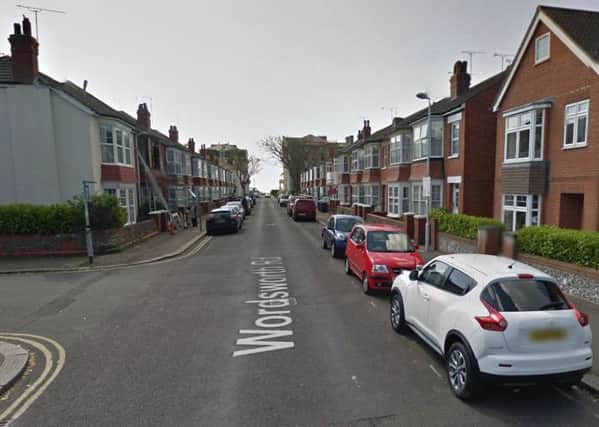Family criticise police and health services who '˜failed' their dead son


Mark Pollard was 35 when he was found unconcious near his flat in Wordsworth Road in Worthing in the early hours of Saturday, September 24.
Mark, who had Asperger’s Syndrome and a ‘long history of illicit drug use’, was later pronounced dead by paramedics, his inquest has heard.
Advertisement
Hide AdAdvertisement
Hide AdHis father, ex-policeman David Pollard, paid tribute to his eldest child’s ‘great sense of humour’ but also spoke of Mark’s long history of drug abuse and trouble with social situations.
An inquest into Mark Pollard’s death began yesterday afternoon at Centenary House in Worthing.
Mark was diagnosed with heart problems that caused him pain and were treated with pain relief drugs, his father told the inquest.
“Unfortunately Mark managed to obtain various drugs from doctors without medically needing them,” his father said.
Advertisement
Hide AdAdvertisement
Hide AdJailed on more than one occasion for ‘petty crimes’, Mark also became addicted to ‘legal highs’, Mr Pollard told the inquest, calling the drugs ‘evil’.
He said his son ‘was failed by the system’.
After Mark’s body was found in Wordsworth Road a post-mortem examination by Dr Jeremy Grant found evidence of several drugs in his system.
Mark’s body showed signs ‘consistent with illicit heroin use’, according to Dr Jeremy Grant’s report which was read out at the inquest.
Dr Grant said there was evidence of heroin at a ‘fatal toxicity’ level, as well as signs of dihydrocodeine and cocaine use.
Advertisement
Hide AdAdvertisement
Hide AdCause of death was combined dihydrocodeine and morphine toxicity, the report said.
Speaking at the inquest, Mark’s family raised concerns about:
Sussex Police’s investigation into his death
Mark being allowed to discharge himself from hospital on September 22
The GP who continued to prescribe Mark medication he did not believe was medically necessary
Advertisement
Hide AdAdvertisement
Hide Ad“We used to support him on a day to day basis,” Mark’s father told the inquest.
“From an early age he used to think people were always talking about him, looking at him.”
Mark, originally from Shoreham, attended Slindon college but suffered from low self esteem, Mr Pollard said.
Mark’s father criticised Sussex Police’s investigation into his son’s death, asking why CCTV footage in the area was not checked at the time and why he was not kept more up to date.
Advertisement
Hide AdAdvertisement
Hide Ad“I have never seen the investigating officer,” he told the coroner. “They have not investigated the case correctly.”
“I kept phoning and phoning and phoning and being fobbed off,” he said.
Mr Pollard said the only way he was able to get a response from the police was to write to the chief constable threatening to bring Mark’s coffin to Sussex Police’s Headquarters in Brighton.
“The police have got a lot to answer for,” he told the inquest.
Advertisement
Hide AdAdvertisement
Hide AdAmanda Pollard, Mark’s sister, said: “We raised various queries which should have been investigated.
“He was very scared in the weeks leading up to his death. He had been attacked, he had been threatened.”
Detective sergeant Kevin Scullion spoke at the inquest, confirming that officers had found no signs of a disturbance at Mark’s flat in Wordsworth Road and that officers were ‘not aware of any CCTV in the locality’.
Detective chief inspector Jonathan Hull also spoke at the inquest, addressing the failings around obtaining the CCTV footage.
Advertisement
Hide AdAdvertisement
Hide AdHe told the coroner he believed ‘not enough attention’ was paid to details in that road and confirmed that new guidelines had been issued as a result.
Mr Pollard also asked why his son was able to discharge himself from Worthing Hospital against medical advice two days before he was found unconcious.
Caroline Chandler, a mental health liaison nurse at Worthing Hospital, helped treat Mark after he was admitted on September 21 following a drug overdose.
She said that Mark had told her ‘he had not overdosed with the intent of ending his life’ and did not want to stay for the full course of treatment they were giving him.
Advertisement
Hide AdAdvertisement
Hide AdHe told her of his ‘long history of illicit drug use’, including use of ‘spice’, a ‘legal high’, for many years, but made no mention of heroin or cocaine, she said.
She also said he mentioned a man that came to visit him to try to persuade him not to testify in an upcoming court case.
However she did not find him mentally ill, she said, meaning she could not have detained him against his will, so he was allowed to leave.
Dr Sunil Emmanuel, Mark’s GP, also spoke at the inquest, addressing concerns about Mark’s prescriptions.
Advertisement
Hide AdAdvertisement
Hide AdHe said he had declined requests for other drugs when he first met Mark, saying: “I did not think he needed it for pain.
“I did not think he was in so much pain,” he said, but was unable to rule out pain altogether.
Dr Emmanuel said he felt ‘used’ and ‘manipulated’ by Mark but maintained that cutting Mark off from his prescriptions abruptly might have done more harm than good.
The inquest will continue at a later date.